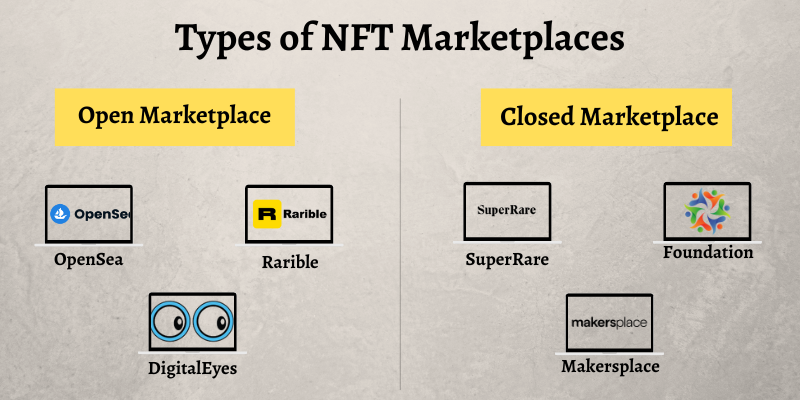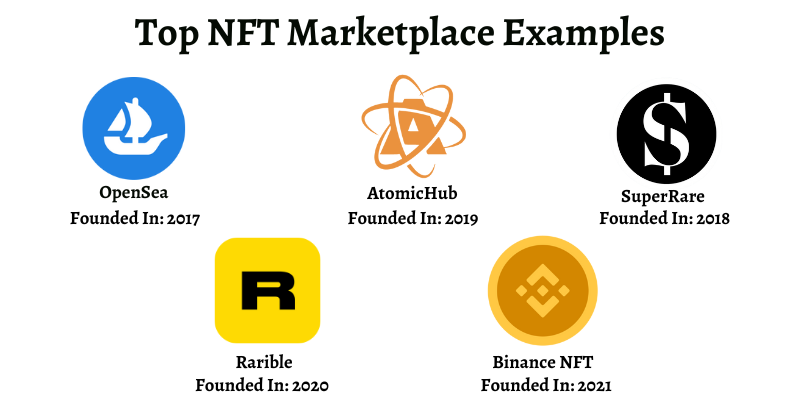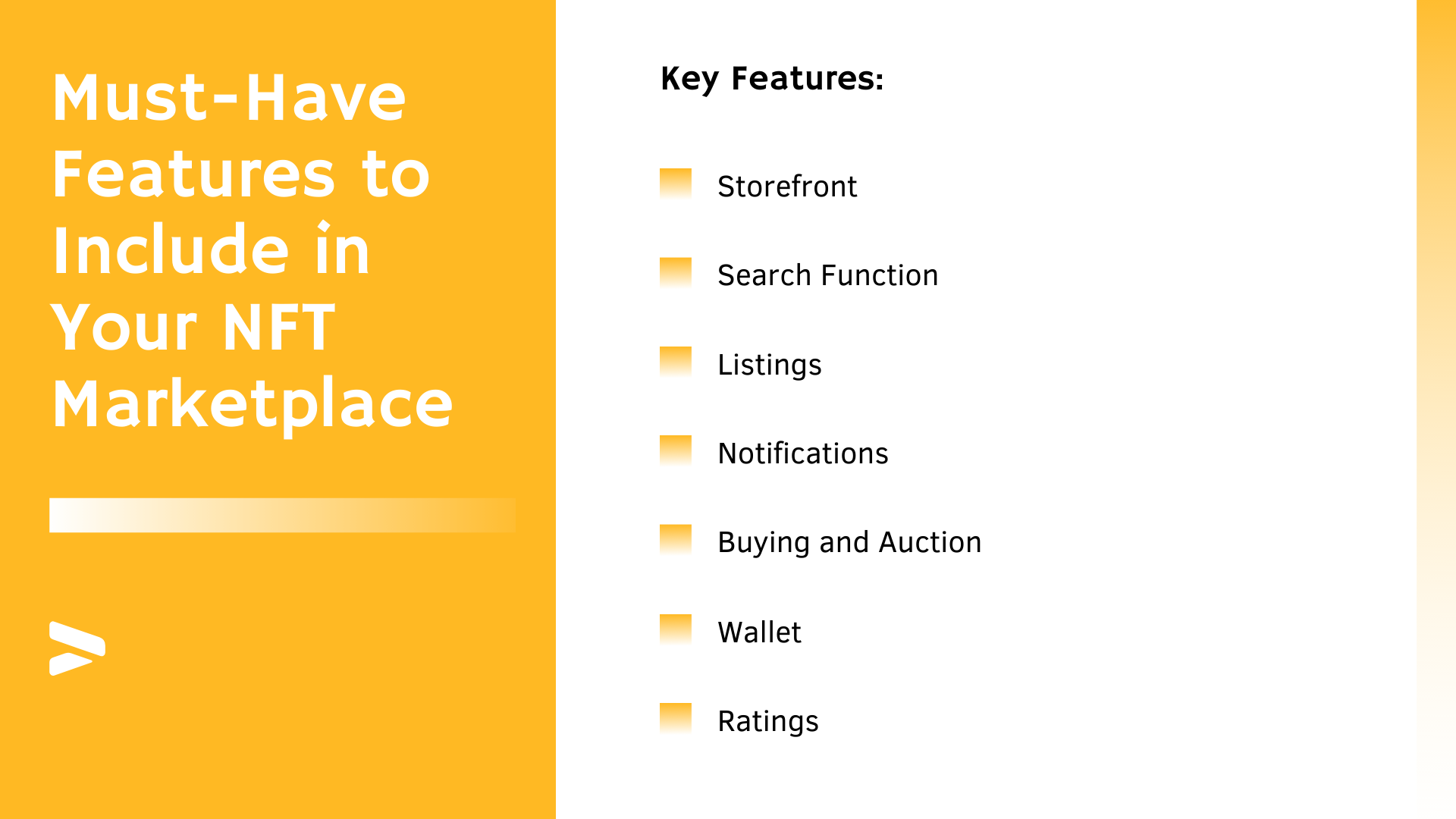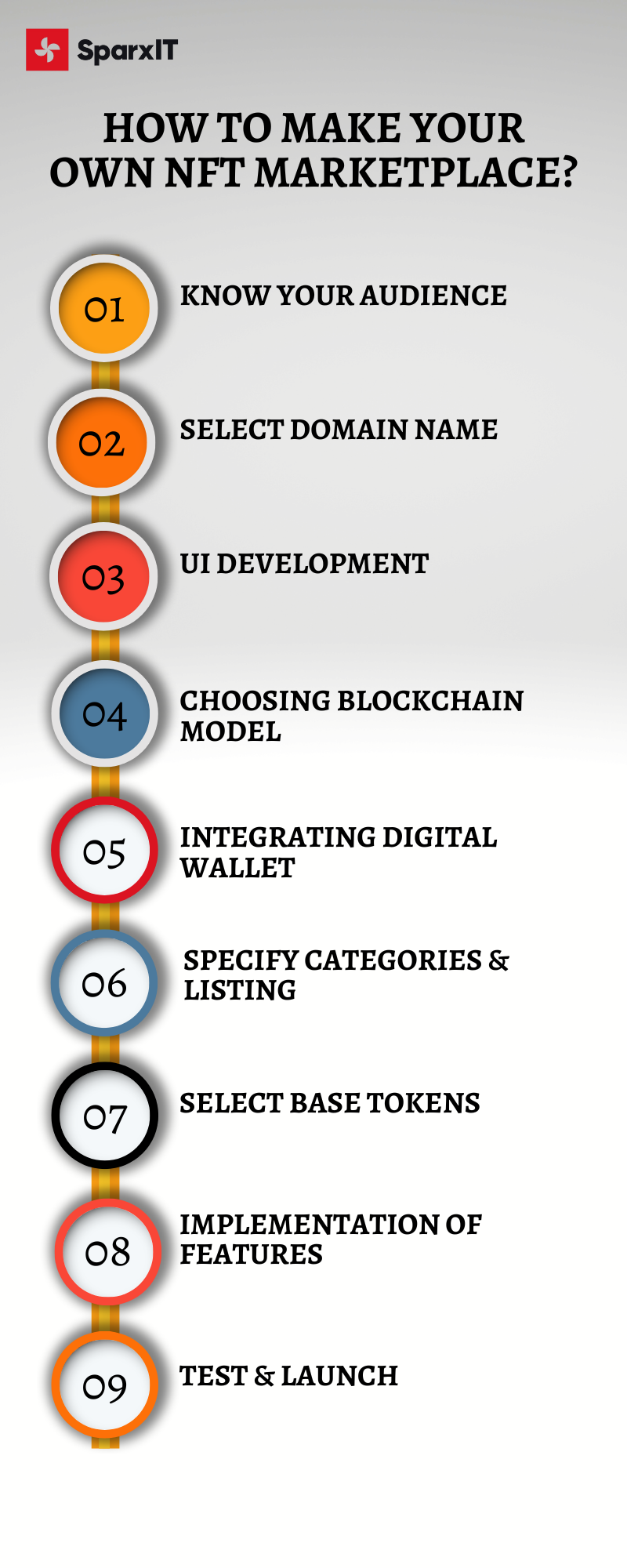NFTs have taken the world by storm, offering a revolutionary new way to buy, sell, and trade digital assets. From unique digital artworks and music to collectible sports cards and virtual real estate, NFTs allow you to own a one-of-a-kind piece of digital content that is verifiably authentic and cannot be copied.
But where do you go to buy and sell these rare digital assets?
That’s where NFT marketplaces come in. These online platforms allow creators to showcase and sell their NFTs while allowing buyers to purchase these unique digital assets securely.
But what makes the NFT marketplace a growth-magnet opportunity for businesses?
What do non-fungible tokens have to offer the digital world?
Well, we are going to answer those questions soon. This blog post shall walk you through the below-mentioned pointers.
What Are NFTs?
NFTs are cryptographic tokens that act as digital certificates authorizing the uniqueness of digital entities, real estate, artwork, other collectibles, and even people.
NFTs are stored on a blockchain, a decentralized digital ledger that verifies the ownership and authenticity of the asset, making it impossible to duplicate or counterfeit.
Unlike fungible tokens like cryptocurrencies, each NFT is distinct and cannot be exchanged for another NFT at a fixed rate.
For example, 1 USD can be replaced with another 1 USD. Also, 1 unit of bitcoin equals 1 unit of bitcoin, which is not the case with non-fungible tokens.
The global NFT market is anticipated to increase from $3.0 billion in 2022 to $13.6 billion by 2027, notwithstanding the short-term changes in the constantly evolving NFT market. The transaction volume of NFTs ($4–16 billion per month) and their skyrocketing pricing encourage new and existing businesses to opt for NFT marketplace development.
What are the Properties of NFTs?
The significant properties of NFTs that intrigue crypto enthusiasts are:
1. Uniqueness
The ability of corporations, content producers, and artists to effectively utilize the digital environment is so constrained. NFTs may be helpful in this situation.
The blockchain ensures the originality of an artist’s work if they convert it into an NFT. NFTs are unique assets as opposed to fungible ones.
The uniqueness of the artwork rests with the NFT established by the original artist, regardless of how frequently the artwork is duplicated across other online platforms.
2. Indivisibility
An NFT must be transferred in its whole to be shared. The next owner may confirm that the NFT can be validated and exists as one piece before purchasing the asset.
It confirms ownership even though NFTs are illiquid.
3. Authenticity
A historical record of ownership of an object or item is referred to as provenance. NFTs’ provenance makes it simple to verify their authenticity.
Anybody may follow an NFT’s historical movement because NFTs are built on a blockchain, no matter where they go.
Blockchain scanners like Etherscan, Polygonscan, and Solscan are the primary means of examining an NFT’s past movement.
4. Portability
NFTs are transportable and simple to use. Similar to cryptocurrencies, NFTs can be kept in a digital wallet, allowing you to carry them everywhere you go while still having access to them on your phone or computer.
It is a key benefit compared to conventional physical assets you need to transport, store, or distribute.
Types of NFT Marketplaces
1. Open Marketplace
Open NFT marketplaces allow anyone to sell and buy NFTs without restrictions. The transactions on the platforms are fast and transparent with a more intuitive transaction model.
You can buy unique NFTs with no compatibility errors.
The transactions on these platforms can occur more simply and provide greater exposure, higher liquidity, extended functionalities, and an increased lifetime.
Open marketplaces are more reliable, with more transparency, accountability, and data accessibility.
Examples: OpenSea, Rarible, DigitalEyes, etc.
2. Closed Marketplace
As the name suggests, closed NFT marketplaces follow a closed ecosystem. Several restrictions can be put upon the traders through platform protocols.
The most common condition in closed marketplaces is that traders can only initiate transactions when invited.
Since closed marketplaces allow only limited NFT transactions, traders may be charged additional fees.
Examples: SuperRare, Foundation, Makersplace, etc.

Type of Transactions on NFT Marketplaces
-
Payable
Traders can buy NFTs using base coins such as BNB, ETH, etc.
-
Token-Based
Sellers can initiate transactions using crypto tokens based on the ERC20 standard.
-
Fractional NFTs
In this type of transaction, NFT buyers can fractionalize ownership of assets. Multiple NFT marketplace users can own fractions of NFTs by implementing ERC-2080 and ABC-20 standards.
The Architecture of Non-Fungible Tokens
The architecture of NFTs is built on several key components mentioned below:
1. Integrating Blockchain
It provides the underlying infrastructure for NFTs. It is a decentralized and distributed ledger that records all transactions and ensures the immutability and security of the data.
The blockchain provides a tamper-proof record of ownership and authenticity, making it a trusted platform for storing and exchanging NFTs.
2. Token Minting
It is the process of creating a new NFT, which involves encoding a unique set of characteristics into a digital token and adding it to the blockchain.
Token minting can be done using platforms like Ethereum, Binance Smart Chain, etc.
3. Digital Wallet
Digital wallets store and manage NFTs. These wallets are similar to traditional cryptocurrency wallets but are specifically designed for NFTs.
They allow users to store, transfer, and view their NFTs and also enable users to participate in NFT marketplaces.
4. NFT Metadata
It is an essential component of NFTs. It includes information such as the name, description, and image of the NFT.
This data is stored on the blockchain and is visible to all users, making it easy to verify the authenticity of an NFT.
5. Smart Contracts
Smart contracts are self-executing contracts programmed to execute automatically when certain conditions are met.
They are an integral part of the NFT architecture that defines the rules and conditions for the ownership and transfer of NFTs.
6. Interplanetary File System (IPFS)
This is a peer-to-peer network for storing and sharing files. It is used in NFTs to keep the actual digital asset associated with the NFT.
IPFS ensures that the asset is stored decentralized and distributed, making it difficult to hack or manipulate.
How Do NFT Marketplaces Work?
The process of selling and purchasing NFTs works through an intermediary platform called the NFT marketplace. You can buy or list and buy NFTs on the platform. So, is the process of selling and purchasing NFTs the same? Well, not exactly. However, the setup remains the same.
NFT marketplace development companies are witnessing a surge in demand for robust platforms, enabling an impeccable rise in NFT sales and creation.
So, how do we buy NFTs?
To buy an NFT, you can add a plugin-based digital wallet called MetaMask to the Chrome browser. This digital wallet will help you initiate secure ether transactions to buy NFTs. You can buy ether and add them to your wallet for purchasing NFTs on a marketplace like OpenSea, Rarible, or others.
Whichever digital art or collectibles you want to buy, you can bid an amount. Generally, the process occurs like an auction house, but there can also be items that can be bought at a set price by clicking the ‘Buy now’ button.
The digital wallet charges some fee to allow purchasing of ether coins.
The NFT marketplace will also charge you a gas fee. After paying the full price, including the gas fee, you may own the collectible.
Now, how do we sell an NFT?
To sell NFTs, you can list the item on a marketplace. To list single or multiple collectibles, you can upload any file type, including PNG, JPEG, MP3, or others. There can be a maximum limit for uploading these files. For instance, on Rarible, the limit is 30 MB.
You can set a price or sell your item to invite bids.
After paying the gas fee from the digital wallet (such as MetaMask), you can sign the sell order and complete the listing process.
The funds will be transferred to your wallet whenever the product is sold. You can use those funds to buy more NFTs or cash them out using a cryptocurrency trading app.
NFT marketplaces use Blockchain Smart Contracts to enable the execution of terms and conditions in selling and purchasing NFTs.
Smart Contracts are codified sets of conditions that are followed based on consensus held by a consortium.
If you hire an NFT marketplace development company, you can present your NFT idea to realize things in real-time.
Benefits of Creating Your Own NFT Marketplace
Why is there so much hype around NFT marketplace development nowadays? The reason lies behind the increasing popularity of NFT. People are talking about its security strength, authentication model, and ease of processing.
In March 2021, the NFT market registered sales worth $220 million, contributing to nearly half of all-time NFT sales till then.
So, if you are a business leader looking to invest your resources in NFT software development, now’s a great time to hire Blockchain developers.
But what are the core benefits of building an NFT marketplace? Let us explore.
1. Versatile Development Methods
Realizing the scope of growth opportunities an NFT marketplace creates, the options to build a platform like that is diversified. You can always do out-of-the-box things with the platform, making it more user-friendly, personalized, and result-oriented.
2. Implementation of Different Blockchains
Since Blockchain is the underlying technology behind the concept of NFTs, you can utilize it in different processes and functionalities in your marketplace. You can use it for currency conversion, data authentication, trading, and execution of condition-bound protocols.
3. Product Awareness
Despite being popular and growing exceedingly well, a large audience is still unaware of what NFT is, how it works, how advantageous it can be in terms of trading, and many other things. So, business enthusiasts have a big opportunity to make people learn and earn. And, if you become a credible knowledge station, you can certainly become their favorite trading station.
4. Easy Development & Deployment
Developing and deploying an NFT marketplace can be as simple or complex as any other application type. You might need to create a complete infrastructure to meet the demands of the users buying or selling NFTs on your platform. You can allow third-party integration to allow users to add, convert, pay, or remit funds, a technical process we can leave to the professionals for now.
5. Revenue-Generating Business Model
An NFT marketplace provides many opportunities to earn your revenues. They are popular, secure, and credible so you can trust their business capability. You need a well-planned business strategy and its right execution to outgrow other contenders in the market. It starts with understanding what your audience may or may not want from an NFT marketplace.
Top NFT Marketplace Examples

If you are a normal user and want to buy or sell NFTs, you can find plenty of options that are just a simple Google search away. But, different marketplaces can offer different user experiences, charge different conversion and listing fees, and provide different facilities.
You may list different features from a range of top NFT marketplaces and put them into a box to make your own.
So, which are the best NFT marketplaces you can take inspiration from to create your own platform?
Let us have a look.
-
OpenSea
OpenSea is among the world’s first and most popular NFT marketplaces. It was launched in 2017 by Devin Finzer and Alex Atallah after being inspired by the inception and growth of CryptoKitties. CryptoKitties is a Blockchain game that allows users to sell, trade, or give away CryptoKitties (plural) in the form of NFTs like game cards. Users can sell, trade, or give away these crypto tokens.
OpenSea is a complete NFT marketplace that supports multiple Blockchains and allows users to sell or purchase artwork, music, domain names, trading cards, and other collectibles.
-
AtomicHub
AtomicHub is another leading NFT marketplace supporting different Blockchain protocols. The marketplace is owned by pink.gg, a Blockchain development company. The company also owns other Blockchain products, particularly serving the interests of NFT customers.
You can buy, sell and trade different assets in different categories on this marketplace.
-
SuperRare
Founded in 2017, SuperRare is identified as a trending NFT marketplace that supports the collection and trading of unique, single-edition digital artworks. Users can create tokenized and crypto-collectible digital items which can be bought or sold through a simple procedure.
-
Rarible
Founded in 2020 by Alexei Falin, Rarible is another well-known and established NFT marketplace. Using its efficient interface, the platform allows digital artists and creators to sell their assets, such as digital artworks, memes, or parcels of virtual land.
-
Binance NFT
Binance is already a well-established cryptocurrency trading platform. The company expanded its presence by launching its NFT marketplace website in June 2021. The platform has gained immense growth in a short span of time.
Also Read | Top NFT Marketplace Ideas to Consider
Must-Have NFT Marketplace Features in 2023

What makes an NFT marketplace user’s favorite is its features. The ease of payment, execution of all transactions, interactive checkout, and appealing user interface can be some of the features that can let your platform come out better than your contenders in the market.
Here, we are shedding light on some of the most fundamental features you cannot miss in your NFT marketplace.
1. Storefront
The fundamental concept of an NFT marketplace app or website is no different from that of an eCommerce marketplace. So, you can certainly consider the same approach for creating or deploying these platforms to some extent. A storefront acts as the face of your marketplace, where users would view different products and their details, such as the price or auction window.
2. Search Functions
An NFT marketplace development company can add advanced search buttons to find items of their interests fast and more precisely. They can expand the scope of search results as there can be a wide range of niches of products listed on the marketplace. Being more accurate about the search functions will allow your marketplace users to engage in a smoother buying process.
3. Listings
Developers can engage in easy navigation elements on the platform to make listing products hassle-free on the marketplace. They can also add instructions to inform users about uploading and selling on the NFT marketplace.
4. Notifications
Both sellers and buyers would want to remain updated on the subsequent outcomes of their activities on the NFT platform. Sellers are informed when there are new bids for products they sell. They will also want to know if the products they set a price for are being purchased.
On the other hand, buyers can expect notifications on the authentication of products they want to buy.
5. Direct Buying and Auction
Most NFT marketplaces allow users to buy NFTs at set prices and through a timed auction. A timed auction can be more complex than the conventional or direct buying process, as a product can be sold at a set price without any competition factor.
6. Wallet
users are asked to add a digital wallet to sell or purchase products using the NFT marketplace. The platform should be ensured to support maximum crypto wallets and engage in fast, flawless, and secure transactions. Users are provided with private keys or phrases to initiate their transactions safely.
7. Ratings & Feedback
Ratings and feedback can help ensure different traders’ credibility in a marketplace. One would see the ratings of a particular seller and make an easy call for buying NFTs. Since NFT marketplaces are public platforms, it is also important to bust bad sellers when they are given negative feedback.
How to Create Your Own NFT Marketplace?
We received queries where people often ask two questions; what is NFT, and how do we create an NFT marketplace?
Well, we have answered the first question in the earlier part of this blog, and it is time to discuss the process for creating an NFT marketplace.
So, what are the steps to begin with? Let us find out.
-
Know Your Audience
The first step is to identify your audience and what they expect as your customers. It will help you personalize the platform more effectively.
-
Select Domain Name
A domain name is typically a business name. So, it is important to be careful when choosing domain types and specifying the domain name. You can purchase the domain and hosting services from any provider, such as GoDaddy, Hostinger, etc.
-
UI Development
Once you have a clear image of your marketplace, UI developers can work on its UI. They will code the UI components and webpage with the help of a wireframe provided by the business team.
-
Choosing Blockchain Model
Blockchain is the underlying technology enabling the operation of an NFT marketplace. You would need smart contracts to indulge in the timely execution of all conditions defined by the sellers. Deciding on the right Blockchain platform also depends upon the strength of the community your product will target.
-
Integrating Digital Wallet
Integration of a third-party digital wallet such as MetaMask will allow your NFT marketplace to initiate encrypted, secure, simple, and fast transactions without affecting the regular functionality of the platform as a whole.
-
Specify Categories & Listing
You can pick the product categories your marketplace will offer trading services for. You can specify the listing features for the marketplace, such as direct buying, auction timing, automated fee calculator, etc.
-
Select Base Tokens
Most of the NFT marketplaces use Ether, a cryptocurrency built using the Ethereum Blockchain platform. Technically, however, users can buy NFTs using any cryptocurrencies.
-
Implementation of Features
We mentioned the fundamental features of an NFT marketplace in the earlier section. After setting up a Blockchain and developing a UI, we can implement the features using a programming language.
-
Test & Launch
Now that you have a product ready to use, you can test its functionality, usability, and other important elements with the help of quality testers. A well-tested product escapes any real-time discrepancies and processes loopholes.
Once you are done with testing, you can launch your own NFT marketplace.

Also Read | Steps to Develop an NFT Marketplace For Real Estate
Technology Stack For NFT Marketplace Development
The architecture of an NFT marketplace may include the following technology components:
| Blockchain Platforms | Ethereum, Cardano, Flow |
| Storage Platforms | IPFS , Pinata, Filecoin |
| NFT Standards | ERC-721, ERC-1155, FA2, TRC-721 |
| Front-end Frameworks | React, Angular, Vue |
| Database | MongoDB, MySQL |
| Wallet | HD Wallet, MetaMask |
| Smart Contracts | Solidity |
| Immutable Database | IPFS |
You can inquire about real-time alterations with the NFT marketplace development company during consultation.
How Much Does It Cost to Create an NFT Marketplace?
Those interested in NFT marketplace development services ask about costs to plan their budget before making the final call. It is not a good practice to provide an estimation without considering the client’s needs because it will most likely be inaccurate.
There are several factors to consider when calculating an estimate of NFT marketplace development cost, including the following;
- Project complexity
- Features
- Technology stack
- API integration
- Project duration
- Number of panels being created for different roles
There can be other important factors that drive the NFT marketplace development cost. .
Let us have a look.
- UX/UI Development: $2200 – $5000
- Authorization and Security: $3000 – $8000
- User Profiles: $2300 – $5000
- Home Page: $3500– $10,000
- Search and Filters: $4000 – $11,500
- Product Page: $2000 – $5000
- Reviews & Ratings: $2500 – $5500
- Shopping Cart: $2500 – $5500
- Payments: $2000 – $5000
- Notifications: $2000 – $4000
- Ethereum Incorporation: $4000 – $11,500
- NFT management: $4000 – $11,500
- Inventory Management: $2000 – $5000
- Buyer Panel: $3000 – $7000
- Author Panel: $5000 – $14000
- Admin Panel: $3000 – $10,000
- Total: $47,000– $123,500
This cost estimation may vary, considering the real-time changes from clients.
Also Read | How Much Does It Cost to Build a Blockchain App?
The Future of Gaming With NFTs
Gaming is the most responsible sector for the staggering growth and popularity of NFTs. CryptoKitties, for example, is a Blockchain game that enables its customers to purchase uniquely identifiable game cards called Cryptokitties. These cards were made available in the form of NFTs.
Even today, game cards are among the highest purchased assets on these platforms. Thus, we can conclude that NFTs in gaming or vice versa will expand further.
You can hire an NFT game development company to help you engage in the technological capabilities of NFTs in your game.
Conclusion
NFTs eliminate ownership disputes. We can see the utilization of NFTs in even more applications. With increasing use cases of these cryptographic tokens, there would be demands for sustainable infrastructure and NFT marketplace architecture built on the foundation of Blockchain technology.
The primary objective of this NFT marketplace development guide was to help you comprehend the basics of the development process and other surrounding aspects.
The creation of more NFT marketplaces is inevitable, given the rising trends. Passionate business leaders can expect a bright future in NFT marketplaces and a plethora of growth-oriented business possibilities.
SparxIT is an ISO 9001:2008, NASSCOM-recognized digital solutions provider. We have been serving a global clientele of successful business leaders across industries with blockchain development services. We can help you build a rich-featured, user-oriented revenue-generating marketplace using our expertise in custom NFT marketplace development solutions.
Frequently Asked Questions
Q. 1 Why do I need an NFT marketplace?
If you are a creator looking to sell your digital assets as NFTs, an NFT marketplace provides a platform to showcase and sell your work. As a buyer, an NFT marketplace app development offers access to various unique and rare digital assets that may not be available elsewhere.
Q. 2 What blockchain platforms can I use to build NFT marketplace?
You can use several blockchain platforms to build your NFT marketplace, including Ethereum, Binance Smart Chain, Polkadot, and Flow.
Q. 3 How do I ensure the security of my NFT marketplace?
To ensure the security of your NFT marketplace, you can implement measures such as two-factor authentication, encryption, secure data storage, and audit logs.
Q. 4 Can I create my own NFTs to sell on NFT marketplace?
Yes, as a creator, you can create your own NFTs and sell them on your NFT marketplace. However, ensuring that your NFTs are original and do not infringe on copyright or trademark laws is vital.
Q. 5 How can I integrate my digital assets into NFT marketplace?
To integrate existing digital assets into an NFT marketplace, you need to mint them as NFTs and then list them for sale on the market.
Q. 6 What kinds of payment gateways can I integrate into NFT marketplace?
Payment gateways such as Ethereum, Bitcoin, and other cryptocurrencies can be integrated into an NFT marketplace platform development to allow buyers to purchase NFTs using different digital assets.
Q. 7 What legal considerations must I consider while developing NFT marketplace?
You will need to consider intellectual property rights, anti-money laundering laws, and data privacy regulations when building an NFT marketplace.



